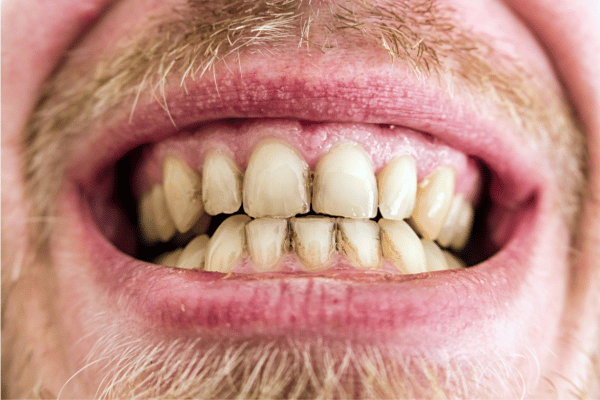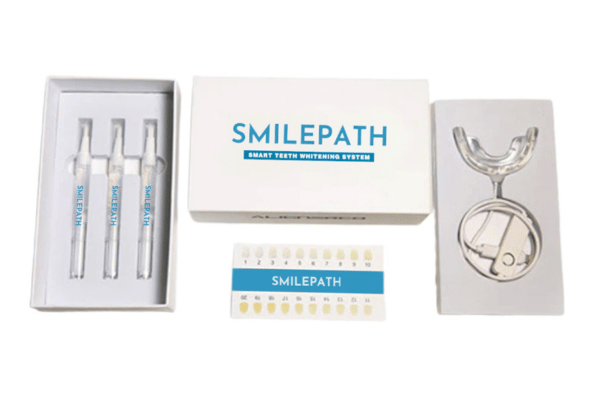
Table of contents
-
The Ultimate Guide To Teeth Whitening For Smokers
-
Why Smokers Need Special Teeth Whitening Care
-
Quick Daily Habits To Minimize Staining
-
The Best Over-The-Counter Teeth Whitening Options
-
Professional Teeth Whitening: Is It Worth Your Time?
-
Lifestyle Changes That Support Teeth Whitening
-
Maintaining Your Whitening Results
-
The Role of Diet in Keeping Your Teeth White
-
Myths About Teeth Whitening Smokers Should Ignore
-
Final Thoughts
-
FAQs
Smiling is often considered a universal language, communicating warmth, confidence, and joy. However, smoking can present unique challenges when trying to achieve a bright and radiant smile. Tar and nicotine can leave stubborn stains that resist regular cleaning. But hope is not lost. Teeth whitening for smokers is not just a possibility; it’s a pathway to restoring your smile’s brilliance. Whether you’re pressed for time or looking for effective solutions, this guide is tailored for those seeking the best approaches to combat smoking-related discoloration.
Why Smokers Need Special Teeth Whitening Care

Smoking introduces tar and nicotine to the mouth, which are notorious for their strong staining capabilities. These substances have a particular affinity for tooth enamel, bonding to it and gradually imparting a yellow-to-brownish discoloration. Unlike stains derived from common dietary culprits like coffee or wine, the discoloration from smoking is more tenacious, often penetrating deeper into the enamel. This deep-set staining challenges conventional whitening methods, necessitating a more robust approach for effective removal.
Consequently, smokers may find that standard teeth whitening products are less effective on their tobacco-induced stains, highlighting the need for specialized teeth whitening care tailored to address these tougher stains. Recognizing the unique challenges faced by smokers in maintaining dental aesthetics is crucial in selecting the most appropriate and effective teeth whitening strategies.
Quick Daily Habits To Minimize Staining
Adopting preventive strategies can play a crucial role in combating the effects of smoking on your teeth's appearance, such as:
- Rinsing Your Mouth: A simple yet effective routine involves rinsing your mouth with water immediately after smoking, which helps to dilute and wash away staining compounds before they can settle.
- Oral Hygiene: Regular oral hygiene practices, including brushing twice a day with fluoride toothpaste and daily flossing, form the cornerstone of stain prevention.
- Whitening Toothpaste: Incorporating a whitening toothpaste into your regimen can also provide an additional defense against surface stains, working to gradually lift discoloration with each use.
These practices, seamlessly integrated into your daily life, can significantly mitigate the staining impact of smoking, helping to maintain the natural beauty of your smile.
The Best Over-The-Counter Teeth Whitening Options

Navigating the aisle of teeth whitening options can be overwhelming, but knowing which products are most effective for smokers can simplify the process. Over-the-counter solutions such as at-home teeth whitening kits, whitening strips, and pens have been specifically designed to cater to those with mild to moderate tobacco stains. These products contain bleaching agents that are milder than what you would find in professional treatments, yet they are adept at tackling the type of discoloration smokers often face.
Utilizing these options can be a convenient and efficient step toward a brighter smile. It’s crucial, however, to adhere strictly to the usage instructions provided with these products. Misuse or overuse can lead to enamel sensitivity or damage, counteracting the benefits of whitening. For those looking for an accessible entry point into teeth whitening without the commitment to professional treatments, these OTC options represent a viable and effective choice.
Professional Teeth Whitening: Is It Worth Your Time?
Professional dental whitening treatments present a compelling option for individuals grappling with the persistent stains associated with smoking. Employing potent bleaching agents far surpassing the strength found in over-the-counter products, these procedures delve deep, targeting the entrenched discoloration that smokers often struggle with. The efficiency of professional treatments is unparalleled, offering significant results within a single session, a feature particularly appealing to those with demanding schedules.
While the initial investment of time may seem daunting, the long-term benefits—remarkable whitening effects and prolonged intervals between necessary touch-ups—make it a strategic choice for individuals committed to reversing the effects of smoking on their dental aesthetics. Furthermore, opting for a professional approach ensures a customized treatment plan under expert supervision, minimizing potential risks and optimizing outcomes.
This bespoke service, tailored to each individual’s specific dental condition and whitening goals, amplifies the value of professional teeth whitening as a time-efficient and effective solution for combating smoking-related teeth stains.
Lifestyle Changes That Support Teeth Whitening

Adopting healthier lifestyle choices plays a crucial role in enhancing and prolonging the effects of teeth whitening treatments.
- Quit Smoking: The most transformative change one can make is to cease smoking, directly attacking the root cause of tobacco-induced staining.
- Reduce Intake of Beverages: Moderating the consumption of known staining agents like coffee, tea, and red wine can help maintain the whiteness of your teeth.
- Use a Straw: Drinking these beverages through a straw can also minimize their contact with your teeth, further protecting against stains.
- Drink Water: Staying well-hydrated by drinking plenty of water not only benefits your overall health but also assists in washing away potential staining substances before they can adhere to your enamel.
By making these adjustments, individuals support their teeth whitening efforts, ensuring more durable and lasting results, all while fostering a healthier lifestyle that benefits their entire well-being.
Maintaining Your Whitening Results
Sustaining the luminosity of your newly whitened teeth requires a conscientious approach beyond the initial treatment. Regular application of whitening toothpaste forms an essential part of your daily oral hygiene, gently lifting new surface stains before they can deepen. For ongoing effectiveness, reintroducing at-home teeth whitening kits for periodic touch-ups can help in combating any recurrence of discoloration. This can also be particularly important for areas prone to stubborn stains.
It's also advisable to schedule dental check-ups and cleanings every six months. These professional appointments are crucial, not only for the removal of plaque and tartar but also for identifying any potential issues early on, ensuring your smile remains not only white but also healthy. Adhering to these steps will aid significantly in extending the life of your teeth whitening results, keeping your smile bright and vibrant.
The Role of Diet in Keeping Your Teeth White
Your diet is a critical factor in maintaining the whiteness of your teeth after undergoing whitening treatments. Foods high in calcium and phosphorus, such as cheese, milk, nuts, and fish, can strengthen tooth enamel and offer a protective barrier against potential stains. Similarly, crunchy fruits and vegetables like apples, carrots, and celery act as natural toothbrushes. Their fibrous texture can help clean the surfaces of your teeth, removing particles and substances that might cause staining.
Additionally, consuming strawberries and pineapple can be beneficial due to their natural acids which are thought to help whiten teeth. However, it's essential to remember that while these foods can support dental health, they do not replace the need for regular oral hygiene practices. Balancing a diet that supports tooth health with consistent care routines will enhance and extend the effects of any teeth whitening treatment, providing a dual approach to maintaining a bright smile.
Myths About Teeth Whitening Smokers Should Ignore

Dispelling myths about teeth whitening is essential, especially for smokers who may encounter a plethora of misconceptions.
1. Myth #1
A common fallacy is the belief that all teeth whitening methods irreparably harm the tooth enamel. This is not the case when products are used as directed and under the guidance of dental professionals. Sensitivity can occur, but this is usually temporary and manageable with the right care.
2. Myth #2
Another widespread myth is that once your teeth are whitened, they will stay bright indefinitely without further effort. In reality, maintaining whitened teeth demands ongoing care and occasional touch-ups, particularly for smokers who are exposed to substances that can cause significant staining.
3. Myth #3
It’s also mistakenly thought that natural remedies alone, such as using baking soda or lemon juice, can achieve the same results as professionally endorsed products or treatments. While natural methods may offer some surface cleaning benefits, they cannot replace the deep whitening effects of scientifically developed products.
Understanding these truths can help smokers set realistic expectations and choose the most effective whitening strategies.
Final Thoughts
Achieving a luminous smile as a smoker is undoubtedly a more challenging endeavor, but it's far from impossible. It demands a proactive stance towards both the treatments you select and the daily habits you cultivate. Navigating this path requires not just a one-time effort but a sustained commitment to preserving and enhancing your dental health and aesthetics.
Opting for the right teeth whitening solutions and adhering to a regimen that supports dental well-being is pivotal. Equally important is understanding that the journey doesn’t end with the visible improvement of your smile; it extends into the choices you make every day to prevent further discoloration. Embrace this process as an integral part of your self-care routine, and the dividends will reflect not just in your smile, but in your overall confidence and quality of life.
FAQs
Yes, teeth whitening is generally safe for smokers. However, it's essential to consult with a dentist before starting any whitening treatment, especially if you have existing dental issues or concerns.
The timeframe for results can vary depending on the method used and the severity of staining. Professional treatments may yield noticeable results after just one session, while at-home kits may take several weeks of consistent use to achieve the desired results.
It's advisable to avoid smoking during the whitening process and for some time afterward to maximize the effectiveness of the treatment.
Whitening treatments are generally effective for natural teeth but do not produce the same results for dental restorations.
Dental insurance coverage for teeth whitening varies depending on the insurance plan and the reason for whitening. Cosmetic procedures like teeth whitening are typically not covered by insurance, but it's worth checking with your provider for specific details.



 Australia
Australia New Zealand
New Zealand Malaysia
Malaysia English
English Portuguese
Portuguese English
English English
English English
English English
English English
English Canada
Canada